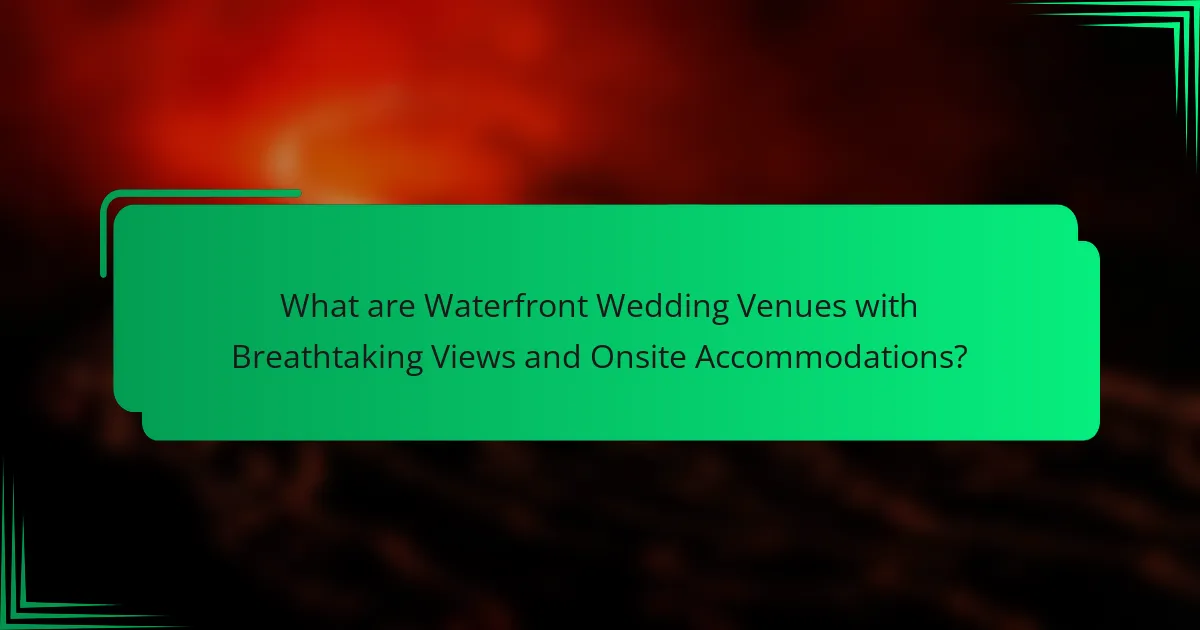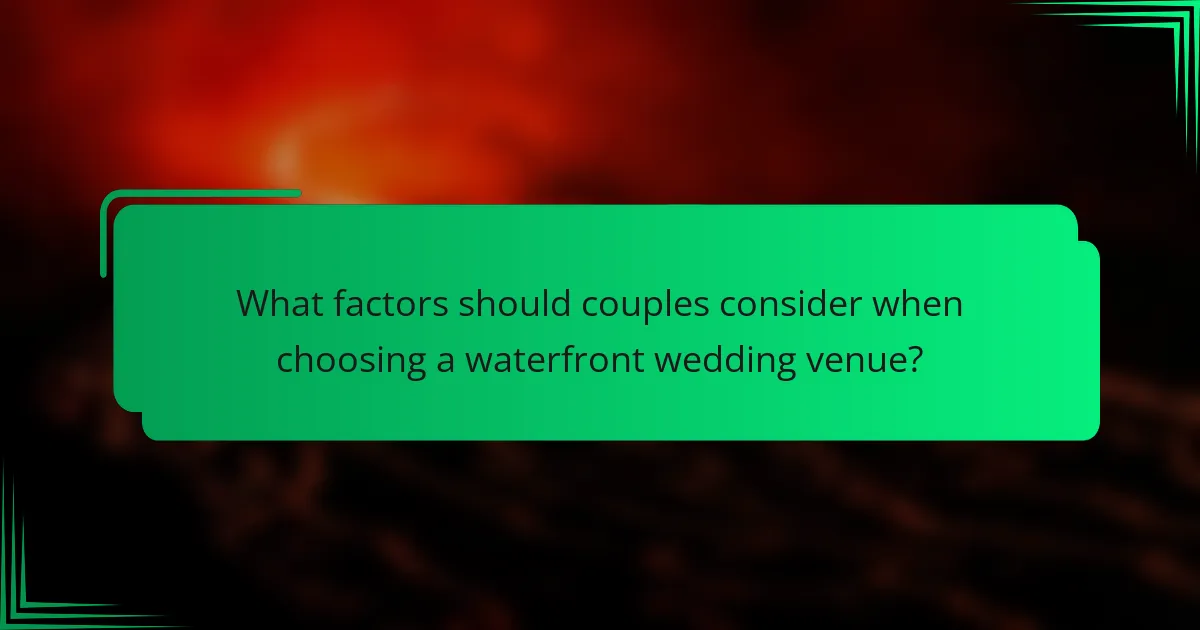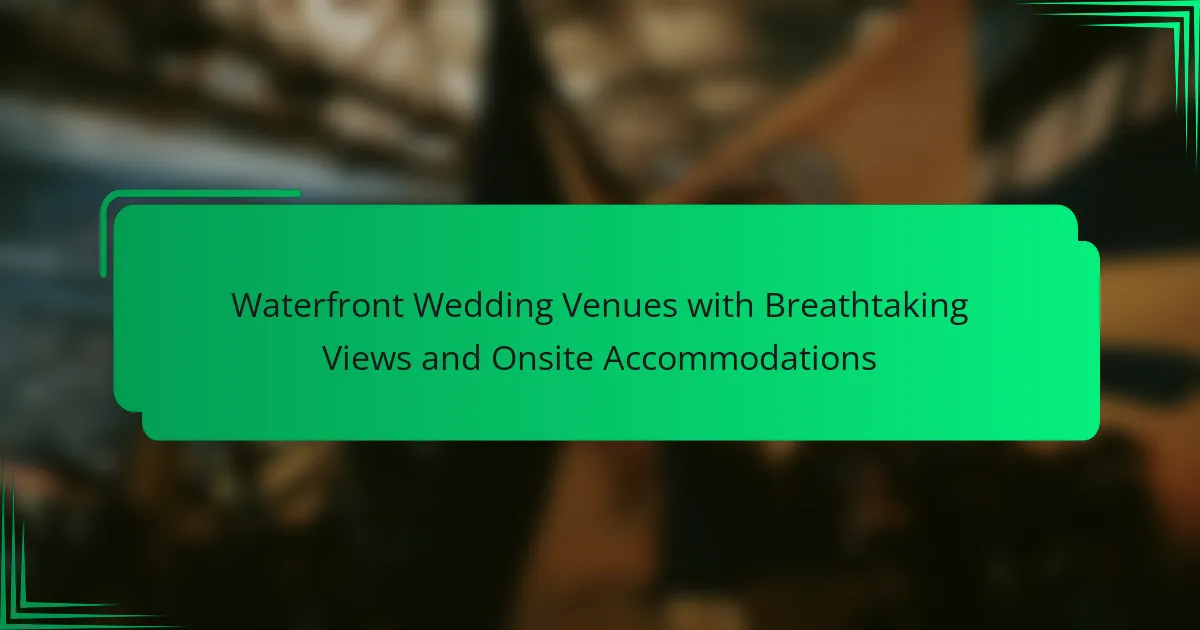Waterfront wedding venues provide couples with stunning views and onsite accommodations, making them ideal for memorable ceremonies and receptions. These locations, including lakeside resorts and coastal estates, often feature outdoor spaces with panoramic scenery and indoor areas that enhance the natural beauty. Key considerations for selecting a venue include location, accessibility, capacity, and amenities such as catering and event planning services. Couples should also evaluate aesthetic appeal, weather contingencies, and budget constraints to ensure a seamless experience for their guests.

What are Waterfront Wedding Venues with Breathtaking Views and Onsite Accommodations?
Waterfront wedding venues with breathtaking views and onsite accommodations include locations that offer scenic waterfront backdrops and facilities for guests to stay. Examples include resorts and estates situated by lakes, rivers, or oceans. These venues often feature outdoor ceremony spaces with panoramic views. They typically offer indoor reception areas that complement the natural scenery. Onsite accommodations ensure convenience for wedding parties and guests. Many venues provide amenities such as catering and event planning services. Popular choices include venues in coastal regions and lakeside retreats. These locations are ideal for couples seeking a picturesque setting for their special day.
How do these venues differ from traditional wedding venues?
Waterfront wedding venues differ from traditional wedding venues primarily in their scenic locations. These venues offer stunning views of water bodies, enhancing the overall ambiance. Traditional venues often lack this natural beauty, focusing more on indoor settings. Waterfront venues usually provide outdoor spaces for ceremonies, allowing couples to exchange vows with picturesque backdrops. Additionally, many waterfront venues feature onsite accommodations, enabling guests to stay close to the event. This convenience is less common in traditional venues, which may require offsite lodging. Overall, the unique setting and amenities of waterfront venues create a distinct experience compared to traditional options.
What unique features do waterfront wedding venues offer?
Waterfront wedding venues offer stunning views of lakes, rivers, or oceans. These venues provide picturesque backdrops for ceremonies and photography. Many waterfront locations include outdoor spaces for both the ceremony and reception. They often feature unique elements like docks or piers for added charm. Onsite accommodations are frequently available, allowing guests convenience and comfort. Waterfront venues may offer exclusive access to private beaches or gardens. They typically provide a serene atmosphere, enhancing the overall experience. These features contribute to a memorable and romantic setting for weddings.
Why are breathtaking views important for wedding venues?
Breathtaking views are important for wedding venues because they enhance the overall experience. Scenic backdrops create memorable visuals for photographs. Couples often seek stunning landscapes to symbolize their union. A beautiful setting can evoke emotions and set a romantic tone. Locations with views can increase guest enjoyment and engagement. Research shows that aesthetic environments improve mood and satisfaction. Venues with picturesque views often attract more bookings. This demand can lead to higher rental rates and profitability for venue owners.
What types of waterfront wedding venues are available?
Waterfront wedding venues include beach resorts, lakeside venues, riverfront estates, and yacht clubs. Beach resorts offer direct access to the ocean and stunning sunset views. Lakeside venues provide serene settings with picturesque backdrops. Riverfront estates often feature lush gardens and waterfront access. Yacht clubs offer a unique nautical atmosphere with views of the water. Each type of venue caters to different styles and preferences for weddings.
What are the most popular waterfront locations for weddings?
The most popular waterfront locations for weddings include beaches, lakes, rivers, and waterfront venues in urban areas. Beach weddings are favored for their scenic ocean views and relaxed atmosphere. Lakeside venues offer tranquility and picturesque backdrops. Riverfront locations provide a unique setting with flowing water and lush surroundings. Urban waterfront venues, such as those in cities, combine stunning views with modern amenities. These locations are chosen for their natural beauty and romantic ambiance, making them ideal for memorable wedding ceremonies.
How do different bodies of water influence venue selection?
Different bodies of water significantly influence venue selection for events. Lakes, rivers, and oceans offer unique aesthetics and atmospheres. Venues near oceans provide expansive views and a sense of tranquility. Lakeside venues often feature serene surroundings and natural beauty. Riverfront locations can present a dynamic backdrop with flowing water. Each body of water can affect accessibility and activities available. For instance, ocean venues may allow for beach activities or water sports. Lakes can host fishing or boating experiences. The choice of body of water can also impact the overall theme and ambiance of the event. Therefore, the specific characteristics of the water body play a crucial role in venue selection.
What amenities do waterfront wedding venues typically provide?
Waterfront wedding venues typically provide stunning views, outdoor ceremony spaces, and reception areas. Many venues offer on-site accommodations for guests. Catering services are often included, along with bar services. Some venues provide event planning assistance to help organize the wedding. Waterfront venues may also have access to recreational activities, such as boating or fishing. Additionally, they often feature landscaped gardens and private beaches. These amenities enhance the overall experience for couples and their guests.
What onsite accommodations are commonly found at these venues?
Common onsite accommodations at waterfront wedding venues include guest rooms and suites. These accommodations often feature scenic views of the water. Many venues provide amenities such as complimentary breakfast and Wi-Fi. Some offer spa services or pools for relaxation. Event spaces for receptions and ceremonies are typically available. Additionally, venues may have outdoor areas for ceremonies with stunning backdrops. Parking facilities are often provided for guests. These features enhance the overall wedding experience for attendees.
How do venues cater to guests’ needs during the wedding?
Venues cater to guests’ needs during weddings by providing essential services and amenities. They offer catering options that accommodate various dietary restrictions. Many venues have accessible facilities for guests with mobility challenges. Onsite accommodations ensure guests have convenient lodging options. Venues often provide event coordinators to assist with planning and logistics. They may also offer transportation services for guest convenience. Additionally, venues create comfortable atmospheres with seating and climate control. Many venues include aesthetic decorations to enhance the wedding experience.

What factors should couples consider when choosing a waterfront wedding venue?
Couples should consider location, accessibility, and capacity when choosing a waterfront wedding venue. The venue’s proximity to accommodations is crucial for guest convenience. Accessibility for all guests, including those with mobility issues, should be assessed. Capacity needs to align with the expected guest list to ensure comfort. Weather conditions can impact outdoor waterfront venues, so couples should review contingency plans. The venue’s amenities, such as catering options and restrooms, are also important for overall experience. Couples should evaluate the venue’s aesthetic appeal, including views and photo opportunities, to enhance their wedding theme. Lastly, budget considerations will influence the final decision, as waterfront venues can vary significantly in cost.
How do seasonal changes affect waterfront wedding venues?
Seasonal changes significantly impact waterfront wedding venues. Weather variations influence the choice of dates and outdoor arrangements. For example, summer often brings warmer temperatures, making it ideal for outdoor ceremonies. In contrast, winter may present challenges like cold temperatures and potential snow.
Spring typically showcases blooming landscapes, enhancing the venue’s aesthetic appeal. Fall offers vibrant foliage, creating a picturesque backdrop. Additionally, seasonal changes can affect availability and pricing. Many venues may offer discounts during off-peak seasons.
Understanding these factors helps couples choose the best time for their waterfront wedding.
What weather considerations should couples keep in mind?
Couples should consider temperature, precipitation, and wind when planning their wedding. Temperature affects guest comfort and attire choices. Precipitation can impact outdoor ceremonies and receptions. Wind can affect decorations and the overall experience. Research shows that outdoor weddings have a higher chance of disruption due to weather. Couples should check seasonal weather patterns for their chosen venue. This ensures they are prepared for potential weather-related challenges.
How can couples prepare for unexpected weather conditions?
Couples can prepare for unexpected weather conditions by having a contingency plan in place. This includes checking weather forecasts regularly leading up to the event. Couples should consider renting a tent or securing an indoor venue option. Having extra blankets and heaters can provide comfort in cooler temperatures. Additionally, packing umbrellas or raincoats ensures guests stay dry if it rains. Clear communication with vendors about weather plans is essential for smooth coordination. According to the National Weather Service, timely preparation can significantly reduce stress during weather-related surprises.
What budget considerations are important for waterfront weddings?
Key budget considerations for waterfront weddings include venue rental fees, catering costs, and decor expenses. Waterfront venues often charge premium rates due to their desirable locations. Catering costs can vary significantly based on the menu, with seafood options typically being more expensive. Additionally, decor may require special arrangements to withstand wind and moisture. Transportation costs for guests can also increase if the venue is remote. Insurance is another factor, as waterfront venues may necessitate additional coverage. Lastly, seasonal pricing fluctuations can affect overall budgets, with peak seasons commanding higher rates.
How do venue costs compare to traditional wedding venues?
Waterfront wedding venues typically have different cost structures compared to traditional wedding venues. Traditional venues often charge a flat fee for rental, while waterfront venues may include additional costs for scenic views and unique settings. On average, waterfront venues can be 10% to 30% more expensive due to their prime locations. Additionally, costs may vary based on the season and demand. Waterfront venues often provide inclusive packages that cover catering and accommodations, potentially offering savings. In contrast, traditional venues may require separate arrangements for these services. Overall, while waterfront venues may have higher upfront costs, they can provide added value through their picturesque settings and comprehensive packages.
What hidden fees should couples be aware of?
Couples should be aware of several hidden fees when planning a waterfront wedding. Common hidden fees include site fees for the venue, which may not be included in the initial quote. Catering costs often have additional charges for service staff, equipment rentals, and gratuities. There may also be fees for using outside vendors, such as florists or photographers. Parking fees can be charged for guests, especially in popular locations. Couples should also consider potential overtime charges if the event runs longer than planned. Additionally, cleaning fees might be applied after the event. Understanding these hidden costs can help couples budget more accurately for their wedding.

What are the best practices for planning a waterfront wedding?
Select a suitable waterfront venue that accommodates your guest list. Ensure the location has breathtaking views and appropriate facilities. Consider the season and time of day for optimal lighting and weather conditions. Check for necessary permits and regulations for waterfront events. Arrange for backup plans in case of inclement weather. Coordinate logistics for catering, seating, and decor to enhance the waterfront experience. Communicate with vendors about the unique challenges of a waterfront setting. Finally, provide guests with clear directions and accommodations if needed.
How can couples enhance the natural beauty of their venue?
Couples can enhance the natural beauty of their waterfront wedding venue by incorporating local flora and natural elements. Using native plants in decorations complements the surroundings and promotes biodiversity. Couples can also utilize natural lighting to highlight scenic views. This creates a warm and inviting atmosphere. Additionally, selecting a color palette that reflects the venue’s landscape can unify the aesthetic. Natural materials like wood and stone for decor can seamlessly blend with the environment. Setting up seating areas that face the water enhances the experience for guests. Finally, incorporating water features such as fountains or candles can add a tranquil ambiance.
What decor elements complement waterfront settings?
Natural materials such as wood and stone complement waterfront settings. These elements create a harmonious connection with the surrounding environment. Light fabrics like linen and cotton enhance the airy feel of the space. Nautical colors, including blues and whites, reflect the water theme. Incorporating greenery and floral arrangements adds vibrancy. Lanterns and candles provide soft lighting that enhances the atmosphere. Outdoor furniture made of weather-resistant materials is practical and stylish. These decor choices create a cohesive and inviting ambiance for waterfront events.
How can lighting be used to create a magical ambiance?
Lighting can create a magical ambiance by enhancing the visual appeal of a space. Soft, warm lights evoke a cozy atmosphere. String lights add a whimsical touch, perfect for outdoor settings. Candles provide a romantic glow, ideal for intimate moments. Uplighting can highlight architectural features and natural beauty. Color-changing lights can set different moods throughout the event. Properly placed lights can guide guests and create focal points. Studies show that lighting significantly affects mood and perception in event settings.
What tips can help ensure a smooth waterfront wedding experience?
Choose a reliable waterfront venue with experience in hosting weddings. Ensure the venue has contingency plans for weather changes. Schedule the ceremony during the optimal time of day for natural lighting. Confirm all vendor arrangements ahead of time to avoid last-minute issues. Provide clear directions for guests to reach the venue easily. Consider accessibility for all guests, including those with mobility challenges. Prepare a timeline for the day to keep events organized and on track. Communicate with your wedding planner regularly to address any concerns.
How should couples manage logistics for their wedding day?
Couples should create a detailed timeline for their wedding day. This timeline should outline every event, including the ceremony, reception, and any breaks. They should also assign specific roles to trusted friends or family members. This ensures that tasks are managed efficiently. Couples must communicate with vendors ahead of time. Confirming arrival times and services reduces last-minute issues. A backup plan for outdoor events is essential, especially at waterfront venues. Weather can change quickly, so having an indoor option is prudent. Couples should also consider transportation logistics for guests. Ensuring everyone knows how to get to the venue is crucial. Lastly, a rehearsal before the wedding day helps everyone understand their roles. This preparation minimizes confusion on the actual day.
What are common challenges faced at waterfront venues, and how can they be addressed?
Common challenges faced at waterfront venues include weather unpredictability, accessibility issues, and environmental regulations. Weather can impact events significantly, leading to last-minute changes. To address this, venues should have contingency plans, such as tents or indoor spaces. Accessibility can be limited due to terrain or water features. Ensuring proper pathways and transportation options can improve access for all guests. Environmental regulations may restrict certain activities or structures. Consulting with local authorities during planning can help navigate these regulations effectively. These strategies can enhance the overall experience at waterfront venues.
Waterfront wedding venues with breathtaking views and onsite accommodations are locations that provide scenic backdrops for ceremonies and comfortable lodging for guests. These venues, including beach resorts, lakeside estates, and riverfront properties, offer unique features such as outdoor spaces, catering services, and recreational activities. The article explores how these venues differ from traditional wedding sites, the importance of breathtaking views, and the various amenities available. Additionally, it discusses factors couples should consider when selecting a venue, budget considerations, and best practices for planning a waterfront wedding.
